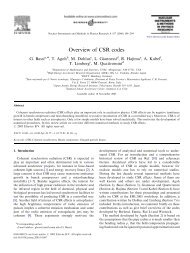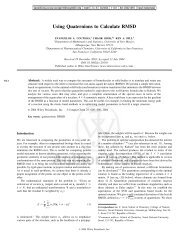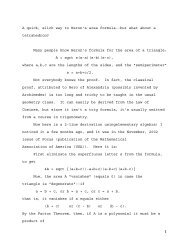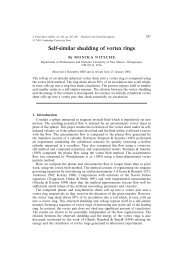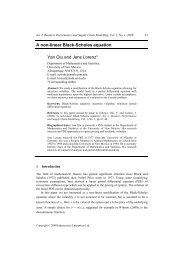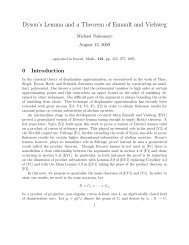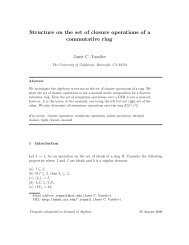OEO Office of Equal Opportunity - Department of Mathematics and ...
OEO Office of Equal Opportunity - Department of Mathematics and ...
OEO Office of Equal Opportunity - Department of Mathematics and ...
You also want an ePaper? Increase the reach of your titles
YUMPU automatically turns print PDFs into web optimized ePapers that Google loves.
SOCIOLOGY 285<br />
Pr<strong>of</strong>essors<br />
Beverly H. Burris, Ph.D., New York University<br />
Richard M. Coughlin, Ph.D., University <strong>of</strong> California<br />
(Berkeley)<br />
Phillip B. Gonzales, Ph.D., University <strong>of</strong> California (Berkeley)<br />
George A. Huaco, Ph.D., University <strong>of</strong> California (Berkeley)<br />
Philip A. May, Ph.D., University <strong>of</strong> Montana<br />
Susan B. Tiano, Ph.D., Brown University<br />
Nelson P. Valdes, Ph.D., The University <strong>of</strong> New Mexico<br />
Howard Waitzkin, Ph.D., MD., Harvard University<br />
Associate Pr<strong>of</strong>essors<br />
Lisa Broidy, Ph.D., Washington State University<br />
Robert A. Fiala, Ph.D., Stanford University<br />
Jane C. Hood, Ph.D., University <strong>of</strong> Michigan<br />
John M. Roberts, Ph.D., Cornell University<br />
Arthur W. St. George, Ph.D., University <strong>of</strong> California (Davis)<br />
Richard L. Wood, Ph.D., University <strong>of</strong> California (Berkeley)<br />
Assistant Pr<strong>of</strong>essors<br />
Nancy Lopez, Ph.D., City University <strong>of</strong> New York<br />
Andrew Schrank, Ph.D., University <strong>of</strong> Wisconsin (Madison)<br />
Tim Wadsworth, Ph.D., University <strong>of</strong> Washington<br />
Pr<strong>of</strong>essors Emeriti<br />
Dodd H. Bogart, Ph.D., University <strong>of</strong> Michigan<br />
Pedro David, Ph.D., Indiana University<br />
Gary D. LaFree, Ph.D., Indiana University<br />
Gilbert W. Merkx, Ph.D., Yale University<br />
Paul D. Steele, Ph.D., University <strong>of</strong> Texas<br />
Charles Woodhouse, Ph.D., University <strong>of</strong> California<br />
(Berkeley)<br />
Adjunct<br />
Gene Levine, Ph.D., University <strong>of</strong> California (Los Angeles)<br />
Keiko Nakao, Ph.D., University <strong>of</strong> California (Irvine)<br />
Introduction<br />
The student interested in sociology <strong>and</strong> related specializations<br />
should take both 101 <strong>and</strong> 280. These courses are<br />
recommended for all beginning students <strong>and</strong> are required for<br />
a major or minor in sociology <strong>and</strong> a major in criminology. Most<br />
higher level courses specify one or both <strong>of</strong> these introductory<br />
courses as prerequisites.<br />
Normally, students should follow the introductory courses<br />
with at least one or two 200-level courses before attempting<br />
more advanced courses. In some areas there is a progression<br />
from less to more advanced courses <strong>and</strong> following such<br />
progressions is strongly recommended even when the lower<br />
level course is not explicitly listed as a prerequisite for the<br />
higher level course.<br />
Note that courses applied toward a major degree may not<br />
be used for any <strong>of</strong> the minor degree programs. In cases <strong>of</strong><br />
overlapping required or elective courses, students must take<br />
additional courses as approved by the sociology undergraduate<br />
advisor.<br />
Major Study Requirements<br />
Major in Sociology<br />
All sociology majors must complete at least 37 hours <strong>of</strong><br />
course work, including the following 19 hours <strong>of</strong> required<br />
courses: 101, 280, 371, 381, 471 <strong>and</strong> 481L. The 18 elective<br />
hours (six courses) are drawn from all sociology courses not<br />
specifically required above but must include at least 12 hours<br />
(four courses) at the 300 or 400 level. The student may select<br />
from a number <strong>of</strong> designated courses that provide a concentration<br />
in one <strong>of</strong> the following subfields <strong>of</strong> sociology:<br />
1. Pre-Law. Provides background for careers or further<br />
training in police, correctional or legal institutions.<br />
2. Human Services <strong>and</strong> Social Policy. Appropriate for<br />
future work in public <strong>and</strong> private agencies, as preparation<br />
for law school or for graduate study in social work,<br />
public administration <strong>and</strong> business administration.<br />
Pre-Law Concentration<br />
The concentration in Pre-Law is designed for students interested<br />
in law school or other careers in the legal field, <strong>and</strong><br />
highlights those aspects <strong>of</strong> law that overlap with crime <strong>and</strong><br />
criminal justice. The concentration provides students with an<br />
introduction to the causes <strong>of</strong> crime <strong>and</strong> deviance as well as<br />
social <strong>and</strong> institutional responses to this behavior. Students<br />
can choose from courses focusing on the personal <strong>and</strong><br />
social forces that give rise to crime, as well as courses that<br />
examine the role <strong>of</strong> the legal <strong>and</strong> criminal justice systems in<br />
dealing with criminals <strong>and</strong> reducing crime rates. To complete<br />
this concentration, students must complete 12 hours from the<br />
following list (Note: 9 <strong>of</strong> these hours must be selected from<br />
the 300/400 level courses listed below):<br />
SOC 205<br />
SOC 211<br />
SOC 213<br />
SOC 312<br />
SOC 313<br />
SOC 412<br />
SOC 414<br />
SOC 416<br />
SOC 418<br />
SOC 423<br />
SOC 424<br />
SOC 425<br />
SOC 426<br />
SOC 491<br />
Crime, Public Policy <strong>and</strong> the<br />
Criminal Justice System<br />
Social Problems<br />
Deviance<br />
Causes <strong>of</strong> Crime <strong>and</strong> Delinquency<br />
Social Control<br />
Sociology <strong>of</strong> Police <strong>and</strong> Social Control<br />
Sociology <strong>of</strong> Corrections<br />
Sociology <strong>of</strong> Law<br />
Selected Topics in Criminology<br />
Gender <strong>and</strong> Crime<br />
Race, Class, <strong>and</strong> Crime<br />
From Youthful Misbehavior to Adult Crime<br />
Drugs, Crime, <strong>and</strong> Social Control<br />
Directed Study in Criminology<br />
Human Services <strong>and</strong> Social Policy<br />
Concentration<br />
The concentration is designed for students interested in<br />
pursuing a graduate degree or a career in human services,<br />
social work, social policy, health care, mental health, or education<br />
(K-12 <strong>and</strong> post-secondary). The concentration aims to<br />
provide broad thematic coverage <strong>of</strong> these fields by drawing<br />
upon elective courses that address topics critical to underst<strong>and</strong>ing<br />
the context within which welfare, health, mental<br />
health, <strong>and</strong> educational institutions operate, including social<br />
problems, race/ethnic relations, <strong>and</strong> socio-economic inequality.<br />
Students must complete 12 hours from the courses listed<br />
below. (Note: 9 <strong>of</strong> these hours must be selected from the<br />
300/400 level courses listed below.) This concentration is<br />
recommended as an alternative to the Social Welfare minor<br />
for students majoring in Sociology. Students majoring in fields<br />
other than Sociology but who have an interest in social work,<br />
social policy, health care, mental health, or education are<br />
encouraged to pursue a minor in Social Welfare.<br />
SOC 200<br />
SOC 211<br />
SOC 216<br />
SOC 225<br />
SOC 300<br />
SOC 303<br />
SOC 308<br />
SOC 310<br />
SOC 321<br />
SOC 322<br />
SOC 345<br />
SOC 400<br />
SOC 415<br />
SOC 420<br />
SOC 421<br />
SOC 441<br />
SOC 445<br />
SOC 488<br />
SOC 499<br />
Foundations <strong>of</strong> Social Welfare<br />
Social Problems<br />
Dynamics <strong>of</strong> Prejudice<br />
Marriage, Family, <strong>and</strong> Their Alternatives<br />
Social Welfare: Programs <strong>and</strong> Policies<br />
Sociology <strong>of</strong> Political Behavior<br />
Sociology <strong>of</strong> Gender<br />
Sociology <strong>of</strong> Aging <strong>and</strong> the Aged<br />
Sociology <strong>of</strong> Medical Practice<br />
Social Epidemiology<br />
Youth <strong>and</strong> Society<br />
The Welfare State<br />
Social Stratification<br />
Race <strong>and</strong> Cultural Relations<br />
Sociology <strong>of</strong> Education<br />
Complex Organizations<br />
Occupations <strong>and</strong> Pr<strong>of</strong>essions<br />
Field Observation <strong>and</strong> Experience<br />
Directed study (limited to topics<br />
approved for the concentration)<br />
Further details are available on each concentration from the<br />
<strong>Department</strong> <strong>of</strong> Sociology <strong>and</strong> undergraduate advisors in the<br />
<strong>Department</strong>.<br />
ARTS AND<br />
SCIENCES<br />
UNM CATALOG 2006–2007 Symbols, page 611.



